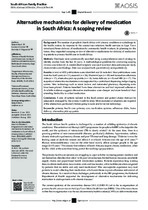| dc.contributor.author | Mash, Robert | |
| dc.contributor.author | Christian, Carmen | |
| dc.contributor.author | Chigwanda, Ruvimbo V | |
| dc.date.accessioned | 2021-09-13T11:34:39Z | |
| dc.date.available | 2021-09-13T11:34:39Z | |
| dc.date.issued | 2021 | |
| dc.identifier.citation | Mash, R., Christian, C., & Chigwanda, R. v. (2021). South African Family Practice. https://doi.org/10.4102/safp | en_US |
| dc.identifier.uri | https://doi.org/10.4102/safp. | |
| dc.identifier.uri | http://hdl.handle.net/10566/6671 | |
| dc.description.abstract | Background: The number of people in South Africa with chronic conditions is a challenge to
the health system. In response to the coronavirus infection, health services in Cape Town
introduced home delivery of medication by community health workers. In planning for the
future, they requested a scoping review of alternative mechanisms for delivery of medication
to patients in primary health care in South Africa.
Methods: Databases were systematically searched using a comprehensive search strategy to
identify studies from the last 10 years. A methodological guideline for conducting scoping
reviews was followed. A standardised template was used to extract data and compare study
characteristics and findings. Data was analysed both quantitatively and qualitatively.
Results: A total of 4253 publications were identified and 26 included. Most publications were
from the last 5 years (n = 21), research (n = 24), Western Cape (n = 15) and focused on adherence
clubs (n = 17), alternative pick-up-points (n = 14), home delivery (n = 5) and HIV (n = 17). The
majority of alternative mechanisms were supported by a centralised dispensing and packaging
system. New technology such as smart lockers and automated pharmacy dispensing units
have been piloted. Patients benefited from these alternatives and had improved adherence.
Available evidence suggests alternative mechanisms were cheaper and more beneficial than
attending the facility to collect medication.
Conclusion: A mix of options tailored to the local context and patient choice that can be
adequately managed by the system would be ideal. More economic evaluations are required
of the alternatives, particularly before going to scale and for newer technology. | en_US |
| dc.language.iso | en | en_US |
| dc.publisher | AOSIS | en_US |
| dc.subject | Primary health care | en_US |
| dc.subject | Medication systems | en_US |
| dc.subject | Adherence clubs | en_US |
| dc.subject | Alternative pick-up-points | en_US |
| dc.title | Alternative mechanisms for delivery of medication in South Africa: A scoping review | en_US |
| dc.type | Article | en_US |

